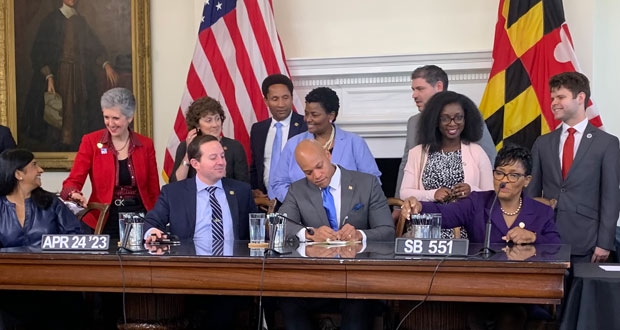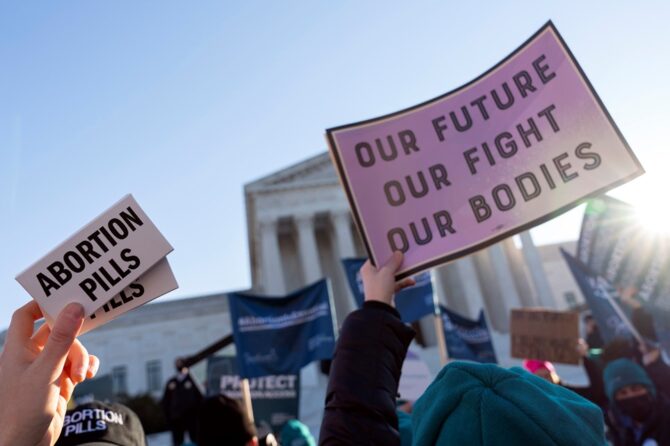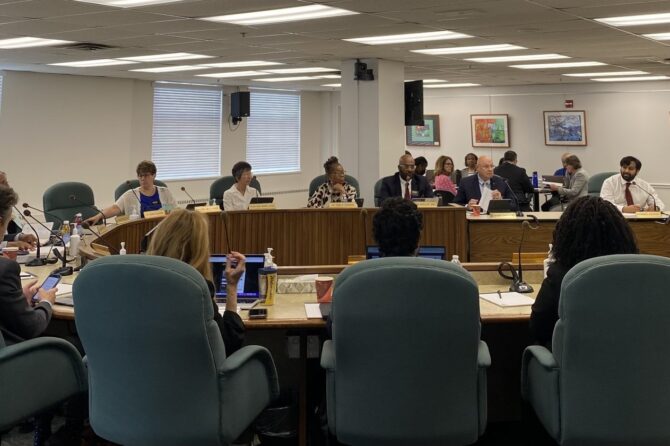THE DAILY RECORD: Recent high school graduates in Maryland will have the option for a paid service year under a bill Gov. Wes Moore signed into law Monday.
Moore, a Democrat, has said the program will be the first state-government-sponsored service year option in the country. The inaugural cohort is expected to be chosen for the fall, according to the governor’s office.
Officials hope the program, seen as an alternative to pursuing a college education or career and technical training immediately after finishing high school, will help channel young people into public service, strengthen the pipeline of workers for state and local governments and expand the state’s service opportunities.
“You can serve in conservation, you can serve in education, you can serve in housing, you can support our veterans, you can serve in reentry work for folks returning from incarceration. It is completely your choice,” Moore said Monday. “We just want to make sure that we’re offering, offering our young people the chance to make our state better.”
Under the Serving Every Region Through Vocational Exploration (SERVE) Act of 2023, the state is expected to accept 200 participants in the first year of the program and 2,000 by the fourth year.
More than 60,000 Marylanders received either a high school diploma or a similar certificate in 2022, according to the State Department of Education.
Participants, who must be Maryland residents and within three years of graduating high school or completing a similar education level, will work at least 30 hours per week and make no less than $15 an hour.
Those who complete at least nine months of the program may also be eligible for a $6,000 stipend.
The state is expected to spend $23 million to pay the program participants over the next five years, according to an estimate from the Department of Legislative Services.
On his first day in office, Moore signed an executive order establishing the state’s Department of Service and Civic Innovation, which will govern the new service year program and the Maryland Corps Program — established in 2016 to provide paid service opportunities to help high school graduates transition to postsecondary education or the workforce.
But the Maryland Corps Program hasn’t made it off the ground. Lawmakers restructured the program in 2022 under former Gov. Larry Hogan, a Republican, but it didn’t receive any funding.
The program received $5.3 million in this year’s state budget, though none of it has been spent. Next year’s budget transfers the funding to the Department of Service and Civic Innovation.
For the Maryland Corps Program, the state will prioritize people from historically marginalized communities.
Those in the Maryland Corps Program will have most of the same responsibilities and benefits as participants in the young adults service program, though Maryland Corps members won’t be required to work at least 30 hours per week.
Leading the Department of Service and Civic Innovation and its initial $18 million budget will be Secretary Paul Monteiro, whom Moore appointed to the role in early April.
Before joining Moore’s administration, Monteiro was the director of the U.S. Department of Justice Community Relations Service, according to the governor’s office.
He previously worked for Howard University, and former President Barack Obama appointed him as the national director of AmeriCorps Volunteers in Service to America, a federal anti-poverty program serving as the domestic counterpart to the Peace Corps.
In addition to the SERVE Act, Moore on Monday signed into law a pilot program to fill positions in the Department of Human Services by partnering with local school systems. The bill, from House Speaker Adrienne Jones, also provides tuition assistance and mentorship opportunities for people to progress within the department.
“We have to be intentional about creating a pipeline for young Marylanders to get involved in state government,” said Jones, a Democrat representing Baltimore County.
Moore also signed off on transferring authority of the Maryland 529 Program, which comprises the state’s prepaid college trust and investment plans, to the Office of the State Treasurer.
Hundreds of parents have reported they had been blocked from accessing their Maryland 529 college savings accounts, and a new method of calculating investment returns led to a sharp drop in the value of some of those accounts. Transferring oversight of the program to the treasurer is a response to the turmoil.
Moore signed off on the state’s $63 billion budget for the fiscal year that begins July 1. Lawmakers have touted the investments for future years that the Fiscal Year 2024 budget makes for implementing the Blueprint for Maryland’s Future education plan, which calls for increasing funding for schools by $3.8 billion each year over the course of a decade.
The governor also signed a bill to require that contractors operating a state-owned nursing home report any citation or fine for a deficiency or enforcement action within 30 days, which came after reports of abuse and neglect over several years at Charlotte Hall Veterans Home.
Among many other pieces of legislation, he signed off on a bill to bolster plans to upgrade Pimlico Race Course, home to the Preakness Stakes and part of thoroughbred racing’s Triple Crown, and Laurel Park in Anne Arundel County.










